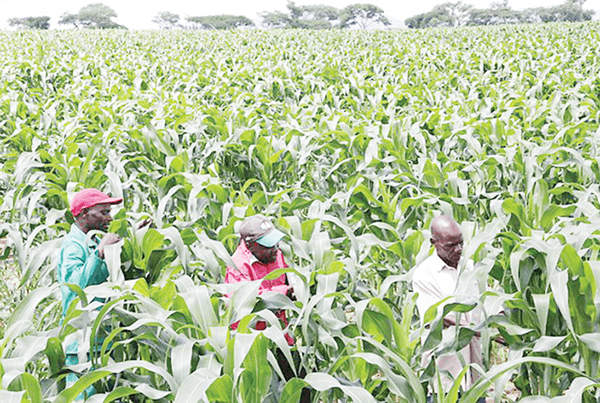
BY MTHANDAZO NYONI
MAIZE and soyabeans farmers yesterday ratcheted pressure on government to switch to a United States-dollar payment model, and backed a new policy classifying the two crops among controlled agricultural products.
This means instead of selling their produce everywhere, farmers can only sell to the State-run Grain Marketing Board (GMB).
However, industry leaders were also weary of the dangers of creating a GMB monopoly, noting that as soon as sanity returns, market forces should be allowed to determine prices.
Government’s strategy is to eliminate high levels of extortion by middlemen, who have taken advantage of loopholes in the system to persuade farmers to sell produce grown under contract to them.
By so doing, corporations that have been injecting capital into farmers to grow crops have been prejudiced, with a report that came out on Sunday saying up to US$20 million would go into tobacco middlemen’s pockets this year alone.
This will prejudice farmers and contracting firms.
In an interview with NewsDay Business, Winston Babbage, a Zimbabwe Commercial Farmers Union (ZCFU) member from the southern region, backed the controls but noted that a review of the payment system was also imperative.
- Chamisa under fire over US$120K donation
- Mavhunga puts DeMbare into Chibuku quarterfinals
- Pension funds bet on Cabora Bassa oilfields
- Councils defy govt fire tender directive
Keep Reading
He said the effect of the middlemen had been felt as far as Binga, where farmers have been extorted.
“We feel the price for grain and soyabeans should have been pegged in United States dollars like what has been done for gold miners,” Babbage said.
The grain utility is currently paying $48 000 for a tonne of soyabeans, $32 000 for a tonne of maize and $38 000 for traditional grains. But with hyperinflation wreaking havoc in Zimbabwe, these payments can only be viable for a few months or weeks, before currency depreciation erodes the buying power. It is the reason why Zimbabwe has created a thriving black market for commodity marketing through the controversial middlemen.
Farmers’ leaders told NewsDay Business that the new policy would boost production and protect them from unscrupulous middlemen.
“We are welcoming this as it does away with unscrupulous traders — the middleperson,” ZCFU president Shadreck Makombe said.
“As farmers we were being short-changed. To make matters worse, some farmers were being ripped-off because they were lured to believe that if they can side market, their contractual obligation will just evaporate into thin air.
“Unfortunately, after side marketing and spending the money from these middle people willy-nilly, they were surprised when contractors came to claim what is theirs. These contractors ended up tracking all what the farmer had. Many farmers were hit hard. Every sober person must sell to the GMB.
“These control measures are good given the situation. But going forward, when everything has normalised market forces then can determine because there will be no need for all this,” Makombe said.
He said controls were required to bring sanity to agriculture.
However, farmers, who used their own capital, would have wanted to market their crops as they wished, farmers’ leaders said.
Zimbabwe Farmers’ Union president Abdul Nyathi said: “No, there is no challenge, in fact there is opportunity. As of now, the status of our economy needs the government to assist production. This is going very well if the government puts those commodities under control.”
However, in its latest newsletter the Commercial Farmers’ Union said the move had literally taken the wind out of the sails of many producers, who were normally able to sell to the highest bidder and play the market, thus increasing their profit margin.
In addition, without the desired security of tenure, that is collateral, the union said the only available sources of finance to farmers often tied them to a set purchase price, which is also often less than the market price.











